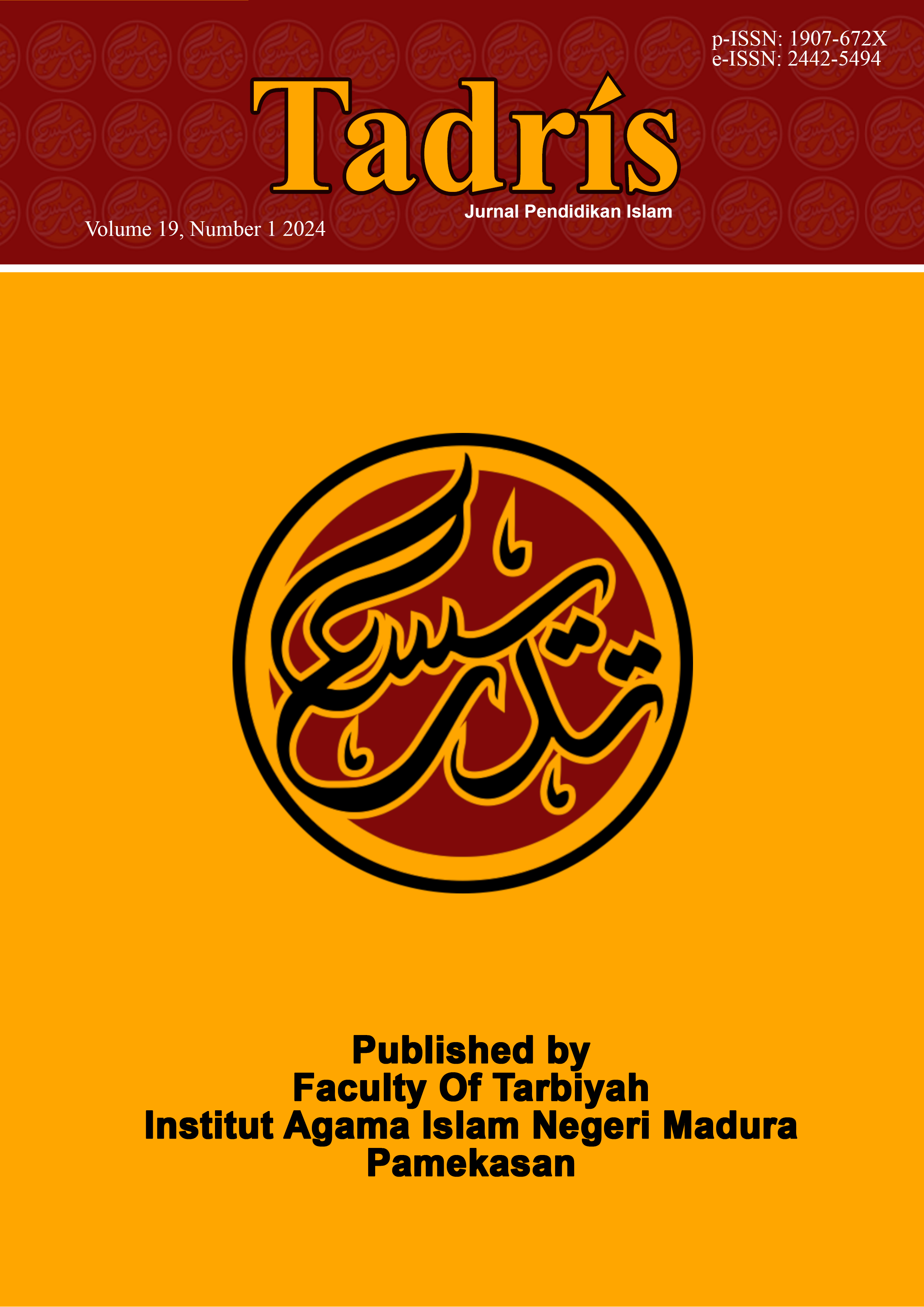The Concept of Islamic Education for Nonmarital Children: A Comparative Analysis of the Thoughts of Muhammad Syahrur and Abdullah Nasih Ulwan
 Abstract views: 312
,
Abstract views: 312
,
 PDF downloads: 234
PDF downloads: 234
Abstract
This article examines the comparative analysis of Abdullah Nasih Ulwan`s thoughts with Muhammad Syahrur regarding the parenting of non-marital children.Departing from the current social phenomenon of society which indicates the number of children born from non-marital realtions, where as individuals who are born naturally, children ideally have the right to be able to live properly like other children resulting from marital relations in giving their obligations and right to children as natural and holy individuals in the Islamic view as in hadith narrated by the Prophet.This paper uses a descriptive qualitative approach with a type of literature review. Analyzing Abdullah Nasih Ulwan’s thought about the role of parents in giving obligations and rights to non-marital children, as well as how Muhammad Syahrur’s thoughts with his theory of milk al-yamin views the obligations and rights of parents toward children as parents’ obligations to chidren through the marital route,as explained by Ulwan about parenting. This was because Syahrur aligned milk al-yamin with marriages of th types mut`ah,misyar, and etc.
Downloads
References
Ady Wibowo, Sunarto. “Hak Dan Kewajiban Orangtua Dan Anak (Alimentasi) Menurut K.U.H. Perdata Dan U.U No. 1 Tahun 1974.” USU Digital Library, 2003.
Agus, Zulkifli. “Konsep Pendidikan Islam Terhadap Pendidikan Anak Usia Dini (Paud).” Raudhah Proud To Be Professionals : Jurnal Tarbiyah Islamiyah 3, no. 1 (2018): 39–56. https://doi.org/10.48094/raudhah.v3i1.24.
Ahmad Atabik, and Ahmad Burhanuddin. “Konsep Nasih Ulwan Tentang Pendidikan Anak.” Elementary vol 3, no. 2 (2015): hlm 275-276. http://journal.stainkudus.ac.id/index.php/elementary/article/download/1454/1330.
Astuti, Ria, Erni Munastiwi, and Muqowim. “Digital Parenting: Utilizing Technology to Instill Islamic Education Values in Young Children.” TADRIS: Jurnal Pendidikan Islam 17, no. 2 (2022): 365–79. https://doi.org/10.19105/tjpi.v17i2.7468.
Ayunina, Nadia Qurrota, and Zakiyah Zakiyah. “Islamic Parenting Sebagai Upaya Mendidik Karakter Islami Generasi Alpha.” Alhamra Jurnal Studi Islam 3, no. 1 (2022): 48. https://doi.org/10.30595/ajsi.v3i1.11855.
Aziz, Abdul. “Konsep Milk Al-Yamin Muhammad Syahrur Sebagai Keabsahan Hubungan Seksual Non Marital.” Universitas Islam Negeri Sunan Kalijaga, 2019. https://digilib.uin-suka.ac.id/id/eprint/42440/.
Earnes, Rebbeca. Positive Parenting: Sebuah Panduan Keparentingan Yang Penting. Cet. I. Yogyakarta: Rumah Baca, 2020.
Hyangsewu, Pandu, Muhamad Parhan, and Ahmad Fu’adin. “Islamic Parenting : Peranan Pendidikan Islam Dalam Pola Asuh Orang Tua Terhadap Anak Usia Dini Di Pembinaan Anak-Anak Salman PAS-ITB.” Taklim: Jurnal Pendidikan Agama Islam 18, no. 2 (2020): 147–54.
Imami, Fivi. “Pengaruh Program Parenting Terhadap Kemandirian Anak Di PAUD Bhakti Pediatrica Payakumbuh.” IAIN Batusangkar Sumatera Barat, 2021.
Joni, Muhammad. “Perkawinan Yang Tidak Dicatatkan: Dampaknya Bagi Anak.” Musãwa Jurnal Studi Gender Dan Islam 12, no. 2 (2013): 237. https://doi.org/10.14421/musawa.2013.122.237-259.
“Kamus Besar Bahasa Indonesia. [Online],” 2020. https://kbbi.web.id/pendidik .
M. Khairil Musthafa. “Konsepsi Pendidikan Islam Menurut Dr. Abdullah Nasih Ulwan.” Jurnal Study Islam Panca Wahana 12, no. 1 (2014): 84–94.
Mahdaniyal, H.N. Fiqih Parenting. Semarang. Mutiara Aksara, 2020.
Maulidiyah, Eka Cahya. “Penanaman Nilai-Nilai Agama Dalam Pendidikan Anak Di Era Digital.” Martabat: Jurnal Perempuan Dan Anak 2, no. 1 (2018). https://doi.org/10.21274/martabat.2018.2.1.71-90.
Mukhammad Nur Hadi. “Muhammad Syahrur Dan Konsep Milkul Yamin: Kritik Penafsiran Perspektif Ushul Fiqh.” Yudisia : Jurnal Pemikiran Hukum Dan Hukum Islam 10, no. 1 (2019): 25–51.
Mustaqim, Abdul. “Memahami Konsep Milk Al-Yamin Ala Syahrur Dan Beberapa Kelemahannya.” Https://Islami.Co/., 2019. https://islami.co/memahami-konsep-milk-al-yamin-ala-syahrur-dan-beberapa-kelemahannya/.
———. “Seputar Kontroversi Disertasi Penafsiran Muhammad Syahrur Tentang Milk Al-Yamin.” Alif.Id, n.d. https://alif.id/read/amm/seputar-kontroversi-disertasi-penafsiran-muhammad-syahrur-tentang-milk-al-yamin-b222691p/.
Sa’ad Musthafa, A. Postive Parenting: Aplikasi Pola Asuh Anak Yang Baik Untuk Mewujudkan Generasi Shalih Shalihah. Sukaharjo: Kiswah Media, 2016.
Suwaid, Muhammad. Prophetic Parenting: Cara Nabi Mendidik Anak. Yogyakarta: Pro-U Media, 2010.
Syahrur, Muhammad. Al-Kitab Wa Alquran: Qira’ah Mu’ashirah. Damaskus: al-Ahali, 1992.
———. “Applying The Concept of ‘Limit’ to The Right of The Rights of Muslim Women, Dalam Syamsuddin Sahiron (Ed.). Prinsip Dan Dasar Hermeneutika Hukum Islam Kontemporer.” ELSAQ. Yogyakarta, 2007.
Syamsuddin, Sahiron. Muhammad Sahrur Koran Hermeneutik Und Die Debatte Um Sie Bei Muslimischen Autoren. Jerman: Otto-Fredrich-Universitat Bamberg, 2006.
Ubaidillah, M. Burhanuddin. “Pendidikan Islamic Parenting Dalam Hadith Perintah Salat.” Jurnal Darussalam: Jurnal Pendidikan, Komunikasi Dan Pemikiran Hukum Islam 10, no. 2 (2019): 349. https://doi.org/10.30739/darussalam.v10i2.378.
Ulwan, A. N. Tarbiyatul Aulad, Diterjemahkan Oleh Emiel Ahmad Dengan Judul Tarbiyatul Aulad: Pendidikan Anak Dalam Islam. Jakarta: Khatulistiwa Press, 2015.
Copyright (c) 2024 TADRIS: Jurnal Pendidikan Islam

This work is licensed under a Creative Commons Attribution-NonCommercial 4.0 International License.
The journal operates an Open Access policy under a Creative Commons Non-Commercial 4.0 International license. Authors who publish with this journal agree to the following terms:
- Authors retain copyright and grant the journal right of first publication with the work simultaneously licensed under a
 Commons Attribution-NonCommercial 4.0 International License
Commons Attribution-NonCommercial 4.0 International Licensethat allows others to share — copy and redistribute the material in any medium or format, and adapt — remix, transform, and build upon the material.
- Authors are able to enter into separate, additional contractual arrangements for the non-exclusive distribution of the journal's published version of the work (e.g., post it to an institutional repository or publish it in a book), with an acknowledgement of its initial publication in this journal.
- Authors are permitted and encouraged to post their work online (e.g., in institutional repositories or on their website) prior to and during the submission process, as it can lead to productive exchanges, as well as earlier and greater citation of published work (see The Effect of Open Access).














